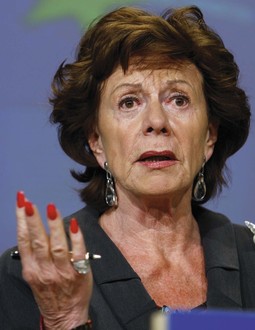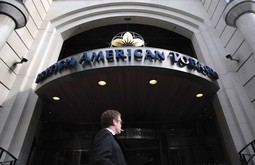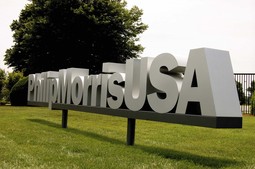Published in Nacional number 707, 2009-06-02
FOREIGN PRESSURE on domestic tobacco industry
BAT and Morris destroying Adris Group with the help of the EU
Excise taxes on all types of cigarette will be the same as of 1 June, which will favour foreign manufacturers, and hurt local producer Adris: Croatia will be the first EU candidate country that will have to implement the measure before acceding to the Union
 ANTE VLAHOVIC, CEO of the Adris Group, the name the business has gone under since the Rovinj Tobacco Factory (TDR) diversified into the tourism sector in 2003British American Tobacco and Philip Morris International, two multinational tobacco firms, are behind the sudden urgency in adopting amendments to legislation on a special tax on tobacco products in Croatia that will open wide the doors to the Croatian market for them. The two companies succeeded in doing so through successful lobbying before the European Commission, and Croatian Government is forced to accept having to speed up changes to legislation in the sector in order to prevent a new delay in the accession negotiations on the road to the EU. Nacional has confirmed this information from sources close to the Adris Group, whose domestic market share could soon drop significantly - some say upwards of 30 percent. Further confirmation has come from foreign business sources informed of the dynamics of the lobbying being carried out by BAT and Philip Morris.
ANTE VLAHOVIC, CEO of the Adris Group, the name the business has gone under since the Rovinj Tobacco Factory (TDR) diversified into the tourism sector in 2003British American Tobacco and Philip Morris International, two multinational tobacco firms, are behind the sudden urgency in adopting amendments to legislation on a special tax on tobacco products in Croatia that will open wide the doors to the Croatian market for them. The two companies succeeded in doing so through successful lobbying before the European Commission, and Croatian Government is forced to accept having to speed up changes to legislation in the sector in order to prevent a new delay in the accession negotiations on the road to the EU. Nacional has confirmed this information from sources close to the Adris Group, whose domestic market share could soon drop significantly - some say upwards of 30 percent. Further confirmation has come from foreign business sources informed of the dynamics of the lobbying being carried out by BAT and Philip Morris.
Thanks to good domestic lobbying Adris Group has for years driven its international competition mad. Thanks to domestic regulations is succeeded in significantly hampering their entry into the domestic tobacco products market. The Adris Group was so successful in this that over the years its management had begun to relax a little in this regard, which is probably why they failed to react in time to try to protect their business interests before the European Commission, and in the end suffered a massive blow to their business operations, one that could have been put off for at least another year.
And while no one at the time connected it to the lobbying activities of BAT and Philip Morris, the unexpected troubles at the Adris Group were nevertheless recently made apparent, and that happened when Government sent a proposal to amend the law on the special tax on tobacco products to Parliament. According to this proposal, as of 1 June the excise tax on all cigarettes will amount to 180 kuna per thousand cigarettes, and a proportional tax of 30 percent of the retail price. Up to now that had been significantly different.
In line with the Tobacco Act and the Ordinance of the processing of tobacco, production and tobacco product brands in Croatia there are three kinds of cigarettes on which tax is paid. Cigarettes are classified into three groups: A (popular), B (standard) and C (extra), depending on the composition of the tobacco and the type of packaging. In Croatian all imported cigarettes were classified as C group, where the excise taxes were the highest, which was particularly irritating to the Adris Group's competition. Now all this has changed, which will make imported cigarettes less expensive in relation to domestic brands, which could lead to a drop in the sales of domestic cigarettes. In Croatia's progress report for 2007 the European Commission cited, as regards taxation, that the existing excise tax system is discriminatory towards imported products and as such is contrary to the Stabilisation and Association Agreement. This fact, and in particular Croatia's hurry to move along on the road to the EU, was recognised by BAT and Philip Morris as their big chance to push for changes that would finally turn the situation on the Croatian market in their favour.
 NELLIE KROES European Commissioner for CompetitionWhich is why they took on the services of lobbyists in Croatia, who briefed them in detail for the discussions they would lead with the members of the European Commission, where they began lobbying for their interests. The lobbyists of the international tobacco companies began their intensive contacts with members of Croatian Government, the people negotiating with the EU and with officials in the European Commission back in early 2008. From their discussions with Croatian officials they learned that Croatia had yet to adopt a position concerning the excise tax, and that this was for them a political problem. This pertained more to the area of other excise taxes, above all in the area of energy, which will also have to be harmonised with those in the EU, i.e. increased, which will in the future have a negative effect on the standard of living for Croatians.
NELLIE KROES European Commissioner for CompetitionWhich is why they took on the services of lobbyists in Croatia, who briefed them in detail for the discussions they would lead with the members of the European Commission, where they began lobbying for their interests. The lobbyists of the international tobacco companies began their intensive contacts with members of Croatian Government, the people negotiating with the EU and with officials in the European Commission back in early 2008. From their discussions with Croatian officials they learned that Croatia had yet to adopt a position concerning the excise tax, and that this was for them a political problem. This pertained more to the area of other excise taxes, above all in the area of energy, which will also have to be harmonised with those in the EU, i.e. increased, which will in the future have a negative effect on the standard of living for Croatians.
After theses discussions the lobbyists informed BAT and Philip Morris that the Croatian finance ministry had to date used only simple ad hoc methods when drafting forecasts of budget earnings from excise taxes and their effect on people's standard of living. This insight was very helpful to them in reacting to the request of the Croatian authorities submitted to the European Commission in May of 2008. Croatia then requested a seven-year transition period during which it would harmonise excise taxes on tobacco products with those in force in the European Union.
When the request emerged the lobbyists for BAT and Philip Morris told the representatives of the European Commission why they felt that there was an economic and political motivation to preserve the existing system of excise taxes in Croatia.
They warned the representatives of the European Commission that the representatives of the Adris Group, through their contacts in Government, the finance ministry and in the EU accession negotiation team from the agriculture ministry, were pushing an invalid proposition that changes to the system of excise taxes on tobacco products would have a negative effect on employers in tobacco-producer communities. This concerned for the most part the Virovitica area. This happened later, as it was precisely these ideas that local tobacco producers and members of the Adris Group board began presenting the press after the coming changes were announced. The lobbyists working for BAT and Philip Morris, however, had already a few months ago warned the representatives of the European Commission that these claims did not reflect the truth, since the Adris Group imports over half of the tobacco it uses for flavour blending in its cigarettes, and that domestic producers export tobacco because the Adris Group does not require the quantity of tobacco they are able to produce.
 TOBACCO GIANTS The headquarters of British American Tobacco in LondonThe debate on this sensitive issue lasted throughout all of 2008, and by April of 2008 there were indications that things would no go well for the Adris Group.
TOBACCO GIANTS The headquarters of British American Tobacco in LondonThe debate on this sensitive issue lasted throughout all of 2008, and by April of 2008 there were indications that things would no go well for the Adris Group.
At the time David Daly, the chief EU negotiator in the area, admonished Croatia for discrimination in the cigarette excise tax. Daly stated that Croatia was using it to protect the Adris Group from foreign competition. Daly said that "if the excise tax is not scrapped by June of 2008, Croatia will not have met one of the conditions for the European Commission to present the schedule for the completion of the pre-accession talks in the autumn."
At the time the Adris Group was unwilling to comment these statements from David Daly. It all resulted, however, in Government recommending changes to the system of excise taxes, which will come into force on the first of June 2009. The members of the Adris Group board of directors were unpleasantly surprised by this, something they had not imagined possible. Indicative of how much of a lobbying success this has been for BAT and Philip Morris are the examples of other EU membership nominee countries. For all new countries joining the EU in 2004, for example, with the exception of Cyprus and Malta, the EU provided a transition period for harmonisation. In Bulgaria the state-owned Bulgartabac Company had a monopoly through to mid 2006, holding 99.3 percent of the market. The company was protected by high import tariffs, while the price of cigarettes was dictated by the government. The liberalisation of the market began in mid 2006 with the scrapping of customs limitations. Just four months later the market share held by Bulgartabac dropped to 86 percent, and then fell to 70 percent. Bulgaria started the harmonisation of the excise tax on cigarettes in 2006, and harmonisation with EU legislation is expected in 2009. Only Croatia will be forced to start implementing these changes in advance.
 The headquarters of America's Philip Morris in Richmond, Virginia; Philip Morris is now a part of the Altria GroupThis will very likely be reflected by a drop in the market share held by the Adris Group, which will also be negatively affected by future changes to the Ordinance on tobacco products. These changes will lead to further corrections to the price of cigarettes, which could again have a negative effect on the earnings of the Adris Group. All of this could have been put off for a time, but was not. Partly because to speed up its accession to the EU Croatia has had to make various compromises, and partly because the Adris Group underestimated the political situation and the circumstances on the market.
The headquarters of America's Philip Morris in Richmond, Virginia; Philip Morris is now a part of the Altria GroupThis will very likely be reflected by a drop in the market share held by the Adris Group, which will also be negatively affected by future changes to the Ordinance on tobacco products. These changes will lead to further corrections to the price of cigarettes, which could again have a negative effect on the earnings of the Adris Group. All of this could have been put off for a time, but was not. Partly because to speed up its accession to the EU Croatia has had to make various compromises, and partly because the Adris Group underestimated the political situation and the circumstances on the market.
Latest news
-
28.10.2010. / 14:15
'A profitable INA is in everyone's interest'
-
28.10.2010. / 09:38
Sanader’s eight fear SDP — Won’t bring down Government
-
21.10.2010. / 15:02
Interior Ministry turned a blind eye on Pukanic assassination
-
20.10.2010. / 09:34
Barisic could bankrupt HDZ



